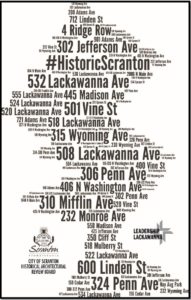The cost of doing business can be much higher for the poor, with a wide variety of businesses offering needed goods and services that are priced at higher than optimum levels.
Popular opinion indicates that many of these businesses are preying on individuals who have placed themselves in unfortunate economic circumstances. Others proclaim that these merchants occupy a vital area of commerce, and are assuming substantial risk while doing so.
John Cognetti, owner of Hinerfeld Commercial Real Estate Services, says that the arguments with higher-priced lenders and rental centers are all part of a good two-sided issue.
“Some of these businesses are performing legitimate services for their customers. Others are not, and are charging too much,” says Cognetti. “There are both sellers and buyers who abuse the system, and it works both ways.”
Cognetti explains that the familiar credit scoring for a consumer is a total compilation of a person’s total credit score over the years, and that some people have no credit history and will be automatically charged a higher rate for a loan.
Receiving that first time credit score can be a difficult task
“Establishing credit history is vital, but for many people this has never been done,” explains Cognetti.
When examining several of the business categories that tailor their products to lower income consumers, Cognetti first zeroes in on the rent-to-own outlets. He says that these merchants can in effect offer people a “test drive” situation for goods which they would never be able to purchase outright.
The check cashing services, renowned for high service rates, are also important because many people maintain no bank accounts. These individuals simply don’t want a bank relationship with its assortment of ongoing fees, and will never take out a conventional loan.
“These check cashing businesses take a real risk every time they cash a check,” says Cognetti. “The same is true for high risk lenders, including those who offer mortgages.”
Mike Hanley, executive director of the United Neighborhood Centers of Lackawanna County (UNC), says that the use of rent-to-own businesses and high rate financial services is simply the high cost of being poor.
“A lot of the people who use these businesses can’t get a regular loan, and for them simply doing business is more expensive,” says Hanley. “It’s hard to estimate the number of predators from the number of legitimate businesses. The sub-prime lenders are certainly legitimate. People don’t have to patronize a predator. The UNC is working to deliver economic justice for everyone through education.”
Evan Lewis, finance manager with One Stop Auto Credit and Tom Hesser Chevrolet, explains that the higher interest rates the working poor often receive for a car loan are not a matter of preying upon them. Instead, the entire process has been developed to allow business to be performed while protecting the merchant and loan originator.
“All interest rates are automatically based on customer credit scores compiled by the credit bureaus,” says Lewis. “The score is calculated by repayment history and the amount of credit that is outstanding on the books and any delinquency numbers. The credit bureau has no knowledge of a customer’s income. People with high debt may get a rate of 13 to 14 percent. Sometimes even physicians and lawyers wind up with a high rate, if their credit history has problems”
According to Lewis, a credit score over 700 is regarded as excellent, with 650 to 700 the average score for a consumer in Northeastern Pennsylvania (NEPA). These top prime rate consumers may typically receive a car loan interest of 6.9 percent to 7.9 percent.
A score of 600 to 650 won’t receive the prime rate, but when a customer has a score of 599 or below they may have to contend with sub prime lending. With some banks, a deal is also based on the down payment and the equity of the vehicle.
“For a sub-prime customer, there’s no easy definition,” says Lewis. “It’s a broad term. They may have had a good credit history with recent difficulty caused by illness or bankruptcy, but definitely they have experienced some credit problems.”
Lewis explains that a higher risk exists for lenders serving the sub-prime market. Payment records show that sub-prime car repossessions may be as high as 10 percent, and for consumers with a 550 score a 15 to 20 percent delinquency rate is a real possibility.
“There definitely are higher losses for sub-prime lenders, rent-to-own businesses and finance companies,” says Lewis. “They must charge higher rates to compensate for losses. These companies as a whole are good service organizations, but, yes, there are some bad apples.”
Lewis also says that, before higher-rate lenders existed, many potential customers had no options. Today, these businesses open doors to people who would have to do without a wide variety of good and services.
“Some social workers will not see whole picture of this complex market, and can be very critical of the businesses and lenders,” says Lewis.
Sub-prime customers who better manage their credit may also qualify for better loan rates in the years ahead. Lewis says that he has personally seen this scenario develop many times.
As the higher rate lending market evolves, Lewis expects business casualties to remain a regular occurrence. The high risk of issuing loans, combined with the intense competitiveness of merchants and lenders in the overall marketplace, can easily add up to a business bankruptcy with huge losses.
Cheryl Davis with the Pennsylvania Department of Welfare identifies a situation she witnessed in the Philadelphia area where one family went to a rent-to-own dealer and actually paid 2.5 times the price of a conventional retailer for a television. “We’re trying to educate people on the real cost of doing business this way,” she says.
David Jobson, M.S., professor of economics, says that the high interest lenders and rent-to-owns function in a larger market area than many people realize.
“These businesses are not just for the poor,” says Jobson. “I personally know of a suburban area outside of Washington D.C. where some extremely upscale housing went up. Many of these residents underestimated their expenses and tax burdens, and now are using rentals to furnish their homes. These businesses also serve mobile people, such as renters who are temporary in a community. Unfortunately, some of these businesses, if the opportunity allows, will make a lot of money on those consumers who are not too astute.”
In addressing the issue of why so many people have developed poor credit scores, Jobson is critical of the amount of credit being offered.
Jobson says, “Many people are being issued credit cards that they have no business receiving. The credit companies are not selective in their approaches, and it results in people misusing credit.”
– Courtesy of the Northeastern Pennsylvania Business Journal





